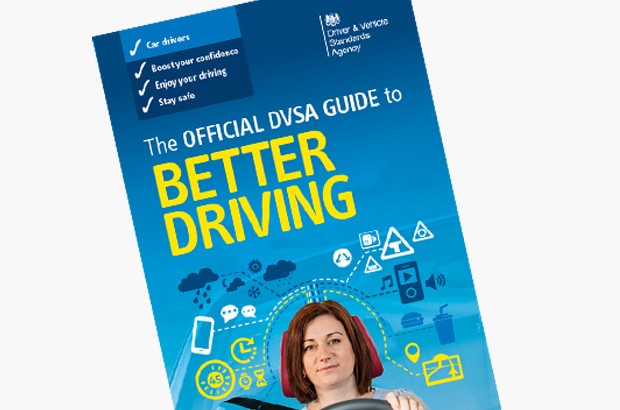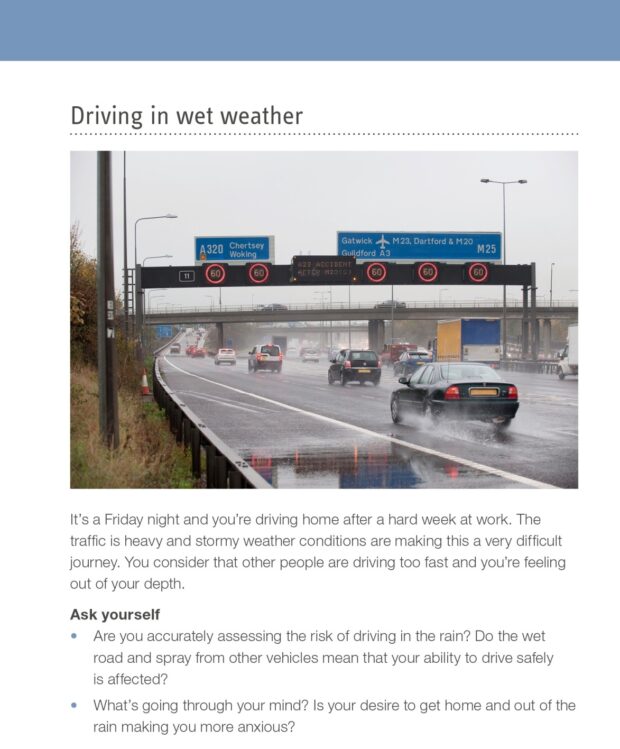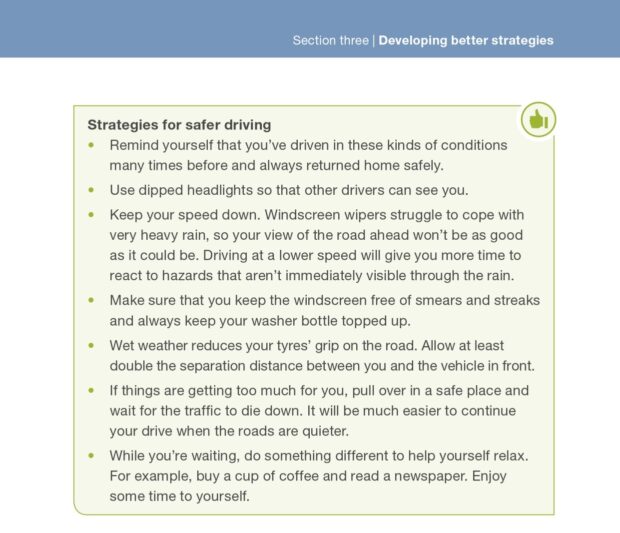
Last month we published our first book focusing on driver behaviour. ‘Better Driving’ looks at the human factors of driving – like your health, mood and attitude. It aims to help readers identify their own tendencies behind the wheel and find ways to turn these into better driving behaviours.
We’ve been publishing our official learning materials in partnership with TSO for many years now. From the best-sellers like ‘The Official Highway Code’ and the theory test books to’ Driving a Tractor’, we cover every category of road use in almost every format.
Our readers told us that we’ve done a splendid job of explaining the technical aspects of driving and riding, but that we now needed to properly examine driver attitude and behaviour.
We’ve been using words like ‘attitude’ and ‘behaviour’ for years, and we’ve touched on the subject in some of our titles. But it was time to explore the topic with an expert and come up with a book about the driver, rather than the driving.
So, ‘Better Driving’ was conceived.
The brains
We all know a bit about what we should and shouldn’t do behind the wheel, but we needed someone who really knew their stuff. Someone who’s done the research and can say what good driving looks like. Someone who could also explain how to identify behaviour traits and what to do about them - for example, lack of confidence, or over-confidence, anxiety and distraction.
Dr Lisa Dorn is the Reader in Driver Behaviour and Director of the Driving Research Group at Cranfield University. We believe there’s no one better qualified - so we invited her to author ‘Better Driving’.
The looks
One of our aims in publishing is to make our material accessible to the widest range of people possible. We understand that not everyone can or wants to read lots of academic material, regardless of its authority and relevance.
So we’ve designed a stylish book that takes account of different people’s learning styles. Alongside Lisa’s words we’ve included lots of photographs, self-reflection quizzes, diagrams and links to online resources.

It’s for you
You may ask "who is ‘Better Driving’ aimed at?", and our answer is “everyone who drives”. ‘Better Driving’ will be relevant if you have a special reason for needing to build up your confidence or address problem areas.
We also hope that readers will find it useful to manage confidence and anxiety in learner drivers. And professional drivers can use it to manage their moods and reactions during a long working day.
Even if you think you’re a good driver, there are things in this book that’ll get you thinking and help you to become an excellent driver.

The last word...
I’ll leave the last words on ‘Better Driving’ to our author, Lisa:
“Many experienced drivers face challenges; from a lack of confidence on motorways, to how to adapt to new technology, such as driving whilst following instructions from a sat-nav.
“Despite these challenges, few drivers actually take the time to rectify them, which can cause anxiety and stress, and make driving an unpleasant experience. This book will help address these issues, encouraging drivers to self-reflect, giving concrete advice and helping them to gain more confidence in their driving abilities.”
To find out more, visit the online DVSA shop.

35 comments
Comment by John posted on
Pity there isn't a book for cyclists called "Better Cycling"
Oh wait, they don't have to pass any test, so of course the rules don't apply to them.
Comment by Sarah Scott posted on
Hi John,
We don't publish any books about cycling as it's not in our remit as the Driver and Vehicle Standards Agency (DVSA). However, our publishing partners, The Stationery Office, produce a book called 'Cyclecraft', giving advice to riders on good cycliing practice.
The Highway Code also covers rules for cyclists, of course.
Comment by Amritpal posted on
I will look into that book - thanks!
Comment by Stuart Grigg posted on
In 40yrs driving, 30yrs Police Service and 23yrs specialising in Road Traffic enforcement the vast majority of cyclists are convinced that the Highway Code has nothing to do with them anyway! They ride where they like when they like and have nil consideration for other road users anyway including all pedestrians of all ages and abilities they ride as if they are exempt from any rules of the road and nobody seems interested enough to educate them anyway!
Comment by bilal posted on
See cyclists go through red lights
Comment by J.F.Williams posted on
Is there a reason for not quoting the price?
Comment by Sarah Scott posted on
Hi there, JF Williams,
Yes there is a reason. This is a blog about why we developed 'Better Driving' and how we think it can help drivers to improve. We know from experience that people don't like being sold stuff in blogs - that's what adverts are for.
I can tell you that the price of Better Driving is £9.99 and we've included a link to our online shop at the end of the blog, giving readers the opportunity to check out prices and (maybe!) buy this and other titles.
Comment by Philip Morgan posted on
Will this publication be available through TSO?
Comment by Sarah Scott posted on
Hi Philip,
Yes, Better Driving is available through TSO. At the end of the blog we've included a link to the online shop, where you can buy this title for £9.99.
Comment by Frank Hyland posted on
How about better motorcycling?
Comment by Chris Higgs posted on
The IAM already do a very good guide to better motorcycling.
'How to be a better rider', available via membership but also Amazon for non-members.
Comment by Doug Johnson posted on
the police riders guide to better motorcycling has been available some time. 11 99 tso
motorcycle roadcraft
Comment by Derrick Coward posted on
Under 'Strategies For Safer Driving' you say "Wet weather reduces your tyres' grip on the road. Allow at least double the separation distance between you and the vehicle in front".
Now, I don't know what follows in the book, but it seems to me that you've missed an ideal opportunity to explain WHY this is so. It's so important to always back up this particular statement with an explanation. The most common type of collision is a rear end shunt, and drivers, novice or those with years of driving behind them (I hesitate to call them 'experienced') must have impressed upon them that they need to brake more gradually in the wet to avoid the wheels locking and why they lock. One other reason is that, more often than not, the vehicle behind them will be too close, hence, reducing the risk of being rear ended.
In my 22 years as an ADI (now retired) I impressed on those I taught that "You are going to forget an awful lot of what you need to remember for safe driving, but NEVER forget the 2 second rule! It will seem to you that there is enough time for you to stop, but there won't be!"
No matter how well someone is taught to drive, they will inevitably, at least in part, drive unsafely after passing, and beyond. Call me a pessimist and/or unPC, but I am a realist.
I look forward to reading your comments.
Comment by Derrick Coward posted on
I don't seem to have had a reply to my comment. Is there a reason for this?
Comment by Bill Pope posted on
Hi Derrick
Fair point. The sort of detail you mention doesn't fit into a pullout box like this strategies one. Also these sorts of skills and understanding are dealt with in other books like 'essential skills' and Roadcraft. As Sarah says, this book takes a very different approach to complement those, rather than repeat or build on them. We hope it appeals to post-test drivers who are less comfortable with what they would see as a technical approach too, so we can really engage them in improving. It's also to provide a standard and strategies on the 'softer' aspects of driving and behaviour that some ADIs and trainers might be less practised at getting across.
Comment by Derrick Coward posted on
You know, It's very rude to ignore someone's questions and comments.
Comment by Sarah Scott posted on
Hi Derrick,
Sorry for the delay in replying to your post.
I'm the publishing manager, not a technical or operational member of staff, so I've passed your comments onto our senior driving examiners - they're better qualified to answer.
I'll let you know soon what they have to say.
Sarah
Comment by Derrick Coward posted on
Thanks for your reply Sarah.
Kind regards,
Derrick
Comment by Joseph Buhagiar posted on
No question; well done! You've done a great job. You should all be proud Sarah.
Comment by Sarah Scott posted on
Thank you, Joseph!
Comment by Chris posted on
With reference to John's question on cyclists. Your reply is very poor. Cyclists are a vulnerable road user and are in the Highway book, there is definitely a need for it. Like the highway code it sticks out and this would be an eye catcher and yes cyclist communities do good but there is an area of bias against the driver.
I deliver CPC courses in safer driving and I get inundated concerns why are we here and not the cyclist? Education education education comes to mind.
Comment by Angus McFadden posted on
They are called the Driver and Vehicle Licensing Agency and bicycles are not part of their remit! Why so that so unclear?
If cyclists had to be licenced, taxed, and tested then I am sure they would print books about them. In the meantime, they mention quite clearly in both the Highway Code and The Essential Skills that cyclists are vulnerable road users and should be treated with care.
Comment by Ian gilby posted on
How about a book telling people where they will find there indicators
Comment by Eddie Robinson posted on
Anything that makes drivers think more about their driving can only be a good thing.
Among all of the other publications that a driver should be reading £9.99 does seem expensive as an add on, as much of the information is already available in the Highway Code.
Comment by Tariq posted on
This should be mandatory reading for those attending Speed awareness courses.
Comment by Sandra Manning posted on
My driver training included a session on a skid pan and, among other incidents, I successfully negotiated a long and freshly ploughed, wet earth narrow downhill driveway in the early 70's in Zambia driving a sports car. My son and daughter spent time in their learner driver months driving a Land Rover, which taught them to "read the road" and includes vehicle behavior and safety exits, i.e. if 'X driver' loses control what are my options. Both are competent drivers, have survived potential catastrophic incidents unscathed and enjoy racing motor cycles, sports cars and bicycles.
In my view, driver training has been devalued, lacks an holistic approach and relies too much on modern vehicle technology to allow inexperienced drivers to get themselves out of trouble.
Comment by alan posted on
Can I buy it as an e-book for kindle please?
Comment by Sarah Scott posted on
Hi Alan,
Yes, Better Driving is available as an eBook for both Kindle and the iPad. I can't seem to post links in this comments books, but I can tell you that you'll find the eBook you're looking for on Amazon.
Sarah
Comment by Sarah Scott posted on
*box*!
Comment by Pete Barton posted on
I don't want to appear negative about this publication as if just a few take something from it to change how they drive it is of course worth it. I do however as an ADI of 31 years find it so frustrating when I see idiots of all ages driving dangerously on our crowded roads and not a police officer in sight and so they are left to do whatever they want without being accountable for their actions. I agree with other people about some cyclists who have no regard for anyone else on the road or indeed pavement, no lights, no rules and above all no common sense. Whilst the people who set these DRIVING STANDARDS which only seem to be for new drivers and not the so called experienced ones it would be better to get out there in the real world and sort these people out by maybe re testing every few years. The type of road users I have described would not be buying this new publication. Speeding and tailgating need sorting out !!
Comment by Sarah Scott posted on
Good morning Pete,
I take your point about retesting people throughout their drving career and I know that's a hotly debated topic.
I can tell you that DVSA doesn't just publish national standards for learner drivers, but for all categories. This includes the national standard for developed driver competence, which sets out how you can maintain and develop your competence, post-licence acquisition.
Sarah
Comment by Dennis posted on
I am a driving instructor and it is my experience that wherever I go drivers and riders do whatever they want to do only limited by the thought that they might get caught if doing it illegally.The best strategy I have seen near here is the speed averaging system on the M4.All traffic slows and sticks to the limit because if they don't they will get caught. At a speed camera locally,drivers and riders only slow down where the grid is,it is common to see them speeding up to the grid and speeding away after.Tailgating is very prominent here as it is in most places I guess.The problem is that until someone has to stop in an emergency before running into the back of the vehicle in front,they have no idea what it takes.In many of the cases I have seen,should the driver in front stop as in an emergency,the driver behind would probably not even get his foot onto the brake pedal before he hit it they are that close.Very few road users appear to realise they have indicators fitted to their vehicles and no one has any idea how to negotiate a roundabout.I am struggling to teach my learners how to do it properly and others are doing whatever they seem to want to do.On a roundabout there are probably two different ways to turn left,first exit,four different ways to go ahead,2nd.exit and six different ways to turn right 3rd.exit and we see them all regularly.I am not sure if its laziness or that they dont know how to.
Comment by Naomi posted on
As an experienced driver I would like to brush up technique and learn how to do particular things properly, such as use correct lane for my intended exit at a roundabout or at a staggered junction. I was taught by an ex-police driver fifty years ago and recently found notes I'd made at the time: still very useful. And an expert taught me reverse parallel parking later. I can't afford IAM training and am grateful for any official books/leaflets such as this new one. Lots could be done via YouTube videos. I once went on a ten-week council/RoSPA course on safe driving which was a excellent: the most vivid memory is a shot from below of a rotating wheel on a glass sheet showing how when flooded with water so little of the tread is in contact with the 'road', making braking poorly effective. I heartily agree with those deploring absence of police on the roads actually catching the worst offenders. And the good effect of speed-averaging systems. Another good system is the sign that lights up telling you your speed in a restricted area - nicer and, I think, more effective, than a camera.
Comment by FRANCIS BECK posted on
All books on safe driving are a good idea but as someone pointed out dangerous drivers will not read them. As a driving instructor for 25 years, { now retired} I suggest that the two main driving faults of most drivers are' too fast, too close'. The answer could be compulsory retesting every ten years fror all drivers.
Comment by Angus McFadden posted on
As you pointed out, dangerous drivers don't read books on how to be safe. Why would that not also apply to being re-tested?
The current test isn't perfect - it still lets dangerous drivers through, and that includes those who behave that way on purpose as well as those who are just frightened rabbits as soon as they leave their driveways. On the day, the division between a pass and a fail is partly down to skill and partly to luck. Someone might be a bit low on skill, but high on luck and off they go with a pass certificate.
I've lost count of the number of people who I think ought to give up driving and get a bus pass instead for everyone's sake, but who I have brought up to test standard over a long period. Even before the ink has dried they have begun the steady slide backwards. Re-testing would catch them if luck wasn't on their side on the day.
But the real problem is those who drive dangerously because of a bad attitude. They could easily behave differently on the day of the test and get through. I had one a few weeks ago who, when I challenged him over his attitude admitted in as many words that he wanted to drive fast to impress his mates, because that's what they all did.
There are no simple solutions.